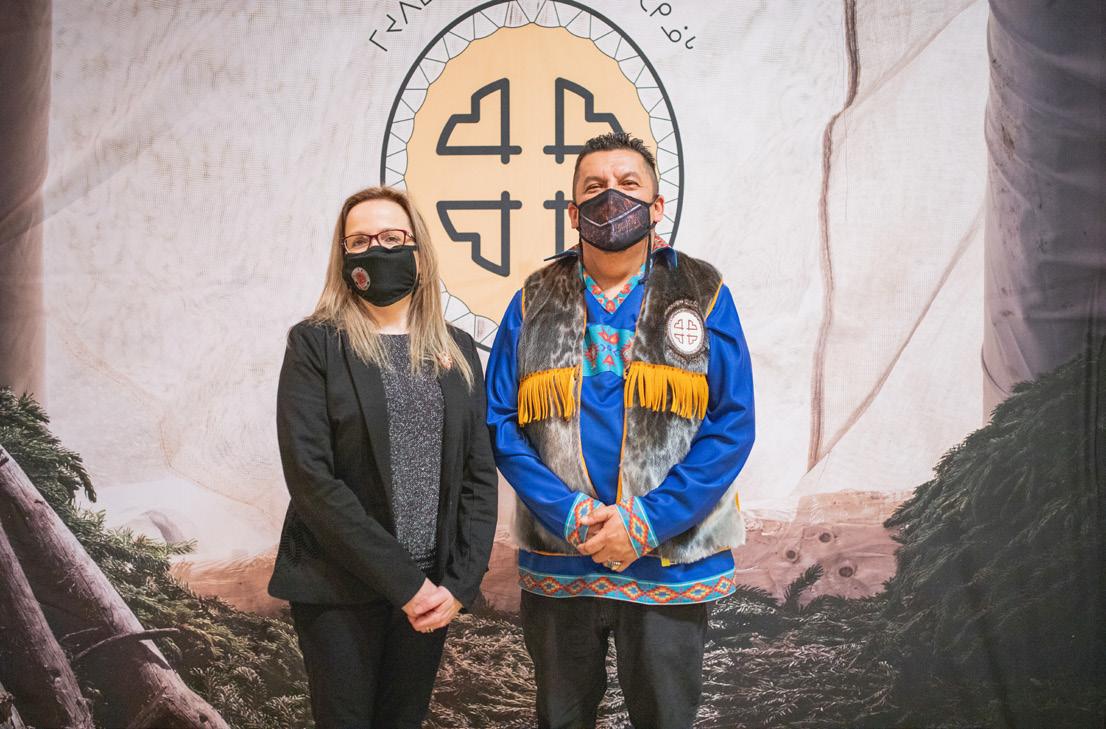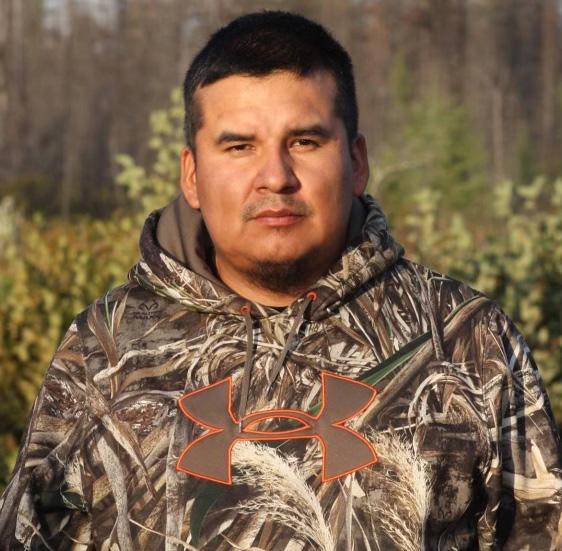
65 minute read
IN BRIEF Grande Alliance tourNew health boss
Editorial Some minor health issues of late have led me to give up wheat and dairy. Chronic inflammation and an unhappy gut had become too uncomfortable to ignore, but I’m happy to say that cutting those two things from my diet worked almost immediately.
The downside, of course, is that in doing so I’ve also had to say goodbye to my favourite Covid-coping mechanism – junk food. Gone are pizza, ice cream, poutine and brownies.
Advertisement
Replacing them are stir-fried meals, nuts, vegetables, hummus and corn tortillas. I like Asian and Mexican food, so breakfast, dinners and lunches have been great. Snacks, not so much.
The gut has been called our second brain by scientists, and I can vouch for that. The mental clarity gained by listening to my body and not consuming the delicious food that was hurting me has been nothing short of exceptional.
So, I’m sitting there with my newfound clarity. It’s a Monday, and I couldn’t help feeling this immense boredom. It was unlike any other boredom I’ve ever felt.
Then it hit me – I’ve been using junk food, and creating a general malaise in my body, as a way of not confronting my own boredom and isolating thoughts.
And what do we do when we start feeling our uncomfortable emotions during Covid? That’s right, we go for a walk.
A moment of Covid clarity
by Dan Isaac
Unfortunately, my inner boredom was only reflected back at me as I stepped outside. The streets that night, after a light dusting of snow, were obscenely empty and I was again left with my thoughts and feelings.
After rounding the block a few times and not seeing a soul I returned home. My partner was up puttering around in the kitchen after putting our eldest daughter to sleep. Confiding in her, my moment of junk food clarity helped ease my existential dread.
We chatted a bit and talked about the things we missed most from before Covid. Mine was meeting friends at a restaurant and hearing the ambient voices in the background, hers was traveling to Greece and Serbia in the fall to visit family. We then proceeded to have a perfectly boring night together, watching Netflix.
So, what’s the point of my little story? Why am I sharing this?
I think it illustrates that no matter how heavy or light, this pandemic – what we’ve all been going through – carries with it an immense mental weight. It’s affecting us all and we’ve all cultivated our own coping strategies.
Sometimes, without knowing it, these strategies are actually hurting us – or worse, our loved ones. Having someone to share our stress, fears, anxieties, dark thoughts or boredoms helps take some of that mental weight off our shoulders.
The holidays can be a difficult under normal circumstances. I’m sure this year’s holiday has been an extraordinarily difficult time for many. If you’re going through them on your own, I feel for you. I really do. But I’d venture to guess that you’re not as alone as you think.
Call up a friend or a family member, see how they’re coping. Let them know what you’re feeling. If you don’t feel like you can talk about your feelings or thoughts with a friend or loved one, you can call the Wiichihiiwaauwin Helpline at 1-833632-4357 (HELP) in Eeyou Istchee or 811 in Quebec.
Talking really helps.
So, I’m sitting there with my newfound clarity. It’s a Monday, and I couldn’t help feeling this immense boredom. It was unlike any other boredom I’ve ever felt.
Then it hit me – I’ve been using junk food, and creating a general malaise in my body, as a way of not confronting my own boredom and isolating thoughts.
And what do we do when we start feeling our uncomfortable emotions during Covid? That’s right, we go for a walk.
Unfortunately, my inner boredom was only reflected back at me as I stepped outside. The streets that night, after a light dusting of snow, were obscenely empty and I was again left with my thoughts and feelings.
After rounding the block a few times and not seeing a soul I returned home. My partner was up puttering around in the kitchen after putting our eldest daughter to sleep. Confiding in her, my moment of junk food clarity helped ease my existential dread.
We chatted a bit and talked about the things we missed most from before Covid. Mine was meeting friends at a restaurant and hearing the ambient voices in the background, hers was traveling to Greece and Serbia in the fall to visit family. We then proceeded to have a perfectly boring night together, watching Netflix.
So, what’s the point of my little story? Why am I sharing this?
I think it illustrates that no matter how heavy or light, this pandemic – what we’ve all been going through – carries with it an immense mental weight. It’s affecting us all and we’ve all cultivated our own coping strategies.
Sometimes, without knowing it, these strategies are actually hurting us – or worse, our loved ones. Having someone to share our stress, fears, anxieties, dark thoughts or boredoms helps take some of that mental weight off our shoulders.
The holidays can be a difficult under normal circumstances. I’m sure this year’s holiday has been an extraordinarily difficult time for many. If you’re going through them on your own, I feel for you. I really do. But I’d venture to guess that you’re not as alone as you think.
Call up a friend or a family member.
the Nation is published every two weeks by Beesum Communications EDITORIAL BOARD L. Stewart, W. Nicholls, M. Siberok, Mr. N. Diamond, E. Webb EDITOR IN CHIEF Will Nicholls DIRECTOR OF FINANCES Linda Ludwick EDITORS Lyle Stewart, Martin Siberok PRODUCTION COORDINATOR AND MANAGING EDITOR Dan Isaac CONTRIBUTING WRITERS M. Labrecque-Saganash, S. Orr, P. Quinn, B. Powless DESIGN Matthew Dessner (Kontroller Media) SALES AND ADVERTISING Danielle Valade, Donna Malthouse THANKS TO: Air Creebec CONTACT US: The Nation, 4529 CLARK, #403, Montreal, QC., H2T 2T3 EDITORIAL & ADS: Tel.: 514-272-3077, Fax: 514-278-9914 HEAD OFFICE: P.O. Box 151, Chisasibi, QC. J0M 1E0 www.nationnews.ca EDITORIAL: will@nationnews.ca news@ nationnews.ca ADS: Danielle Valade: ads@nationnews.ca; Donna Malthouse: donna@beesum.com SUBSCRIPTIONS: $60 plus taxes, US: $90, Abroad: $110, Payable to beesum communications, all rights reserved, publication mail #40015005, issn #1206-2642 The Nation is a member of: The James Bay Cree Communications Society, Circle Of Aboriginal Controlled Publishers, Magazines Canada Quebec Community Newspaper Assn. Canadian Newspapers Assn. Les Hebdos Sélect Du Québec. Funded [in part] by the Government of Canada. | www.nationnews.ca |
facebook.com/NATIONnewsmagazine | Twitter: @creenation_news
Quebec cancels holiday plans
Vaccine program rolls out, but won’t reach Eeyou Istchee soon
by Ben Powless
The Quebec government is imposing a “holiday pause” to stem the record-breaking numbers of new Covid-19 cases in the province by shutting down most retail stores and gatherings during the holidays.
For the period of December 25-January 11 only essential services – including banks, grocery stores, pharmacies, pet shops, hardware stores, liquor stores and cannabis stores – will remain open. Big-box stores like Costco will only be allowed to sell essential items.
The government also announced that all yellow zones across the province were to become orange zones, and all orange zones will become red zones beginning December 17 until at least January 11. In the new red zones that means that bars, indoor dining rooms, gyms and museums will close. The province has said that office workers will have to work from home during this time.
Families in the red zones would be permitted to join a bubble with one other family, whereas currently they are only able to have a single visitor. Outdoor gatherings are also prohibited, except for outdoor physical activities, which allow up to eight participants.
While many of these prohibitions do not affect Eeyou Istchee directly, they are expected to result in a significant decline in travel between Eeyou Istchee communities and other communities in Quebec. The province has recommended against travelling between zones during this time.
Chibougamau and Chapais are set to move into a red zone as of December 17, while Mistissini, OujeBougoumou and Waswanipi will move back to Phase 4 of the deconfinement plan.
Quebec will be keeping primary schools closed until January 11, in line with the Cree School Board, which intends to restart all classes that day, with some classes online only until January 18.
As Quebec began a program to vaccinate at-risk groups against the coronavirus, the Cree Health Board (CHB) announced that it may still be a while before the vaccine is available in the territory.
“Eeyou Istchee is one of the few jurisdictions in Canada that has not had Covid-19 community transmission, this was not by chance and is due to the quality of local and regional leadership, the dedication of the Cree Health Board Public Health Department, the reliability of our public institutions like the Cree School Board and the Cree Health Board,” the CHB said in a statement.
“With the introduction of safe vaccines, the end of Covid-19 restrictions is near and soon we will be able to freely say goodbye to those who have left us and welcome our newest and tiniest community members with hugs and kisses.”
The CHB said that it was working to ensure that adequate personnel, equipment, procedures and facilities were in place so that the vaccination could begin when ready.
The only areas considered at reduced risk, and not requiring a 14-day self-isolation upon return, are Region 8 (Abitibi-Témiscamingue), Region 10 (Nord-du-Québec), Region 17 (Nunavik) and Region 18 (Eeyou Istchee), as well as the Porcupine and Timiskaming regions of northern
- Cree Health Board
Ontario.
However, the CHB said that cases were climbing in northern Ontario and urged travellers to stay vigilant. The board noted that although Region 2 (Saguenay–Lac-Saint-Jean) has improved, cases were still high – the region was seeing between 70 to 80 new cases per day, with 677 current active cases.
Region 8 is considered stable with no evidence of community transmission, and between 1 and 2 new cases a day recently, with 14 active cases overall. Region 10 saw between 0 and 2 new cases, with 3 active cases total.
The CHB urged community members to shop locally or buy online, or to have one person designated to shop for others if necessary.
Quebec vaccinated over 1,200 people in its first two days of its inoculation program, and the province was set to receive a further 4.8 million doses of the Pfizer-BioNTech vaccine currently in use. The federal government was expected to approve another vaccine from Moderna, which would be ready for distribution within two days of approval. Quebec stands to receive 13.4 million doses of the Moderna vaccine. There are another five companies which stand to receive the green light for vaccine distribution.
Quebec has announced that its priority for vaccines are long-term care homes, followed by those in private seniors’ residences and those in isolated communities, including Eeyou Istchee. Those vaccinations are expected to be completed by the end of March 2021.
Vaccines will then be distributed by age group, starting with those 80 and above, those in their 70s, those in their 60s, followed by those under 60 with health risks. Pregnant women and children have not been included in the distribution plan because they were not included in the clinical trials.
Across Quebec, the province’s health authorities reported nearly 2,000 new cases a day in recent days, with dozens of deaths. Nationally, Canada has reported over 479,000 cases, with 76,000 considered active, and over 13,750 deaths.







If you need more information or have additional questions, contact our office in Val-d”Or.
By phone:
Growing the force

The Quebec government announced December 4 it will spend $18.6 million over five years to improve policing in Indigenous communities. The new measures are a long-awaited response to recommendations made by the Viens Commission and the Missing and Murdered Indigenous Women and Girls Inquiry.
Recruitment and retention of Indigenous police officers are a primary focus. One of the first measures will be to fund basic police training for up to 24 Indigenous people annually at Quebec’s Nicolet police academy, about $30,000 per student. Currently only 3% of Nicolet’s graduates are Indigenous – between 18 and 23 every year.
“We really want to make a big effort to get our young men and women interested in this profession,” said Public Security Minister Geneviève Guilbault. “We must foster safe living environments that satisfy specific and changing needs in Indigenous communities and this is what we are doing.”
Guilbault said the plan includes specialized training within Indigenous communities and in their own languages. The training would help local forces investigate family violence and sexual assault cases without support from the Sûreté du Québec.
As many of Quebec’s 22 Indigenous police services are small, sending their limited workforce away for advanced training is difficult. Officers also frequently choose to leave smaller forces not only for better working conditions but because of the tightly connected nature of Indigenous communities.
“You may be called for a conjugal violence at a home where it’s your cousin who is the suspect or the victim,” Shawn Dulude, president of the Association of First Nations and Inuit Chiefs of Police of Quebec, said at the press conference. “You can’t say, ‘I’m going to give the call to somebody else,’ because there’s

Photo by Trish Chiasson by Patrick Quinn
Indigenous policing receives new provincial funding
nobody else. Often you’re alone with your partner working that shift.”
Dulude is trying to counter this problem by facilitating rotations where officers could be exchanged with another First Nation force. While various solutions have been proposed to address the retention issue, it’s difficult for Indigenous police forces to compete without comparable pay.
“I’ve heard more than one Chief say it’s good we have our own police but there’s so much turnaround on staff,” said Ghislain Picard, the Quebec and Labrador regional chief for the Assembly of First Nations. “They train and work with us but because we can’t pay what they’d be paid with the SQ they move on to another police force.”
When an international movement erupted around defunding the police last summer, some pointed out that chronic underfunding of Indigenous police forces is ongoing evidence of systemic racism. Picard is hopeful that renegotiating funding agreements – Ottawa currently pays 52% and Quebec
48% – will make Indigenous policing a more attractive career choice.
“I was just part of a call yesterday with the feds and there’s certainly a clear commitment to move towards a law that would recognize First Nations policing as an essential service and at some point, address the issue of funding as well,” Picard told the Nation. “Ultimately our communities are wanting to have their own police and institutions, so Quebec should support that notion.”
As the MMIWG inquiry noted, this autonomy is particularly important when delays can make the difference in finding a missing person. The government announced that initiatives developed “by and for” Indigenous women and girls will respond to their specific challenges, including $1.2 mil-
-Isabelle Charest
lion dedicated to preventing sexual exploitation of minors.
“Everyone’s collaboration is essential in ensuring Indigenous women and girls may live in safety,” stated Isabelle Charest, minister responsible for the status of women. “All forms of violence must cease. The Comité des femmes autochtones is advising and supporting the Quebec government in the implementation of these initiatives.”
To give sexual assault victims greater trust in the legal system, the province’s forensic science laboratory will integrate liaison officers to support Indigenous police forces. With this measure, it’s hoped victims will be better informed and supported at different stages of the judicial process.
In response to numerous inquiry findings of systemic discrimination, the province also appears to be addressing repeated calls for cultural sensitivity training. Correctional officers will be given cultural training to broaden their understanding of Indigenous realities while the ethics commission’s complaint procedure will be adapted at all stages to Indigenous peoples’ needs and experiences.
Finally, $4.1 million will fund an Indigenous police forces status report and provide support for the First Nations Chiefs of Police Association.
“There needs to be the space and time to speak broadly about the whole issue of justice,” asserted Picard. “Nobody will say anything against what was announced last week – it’s certainly a plus, but we have to go beyond this.”
Booting Beyak
A motion introduced by Senator Mary Jane McCallum could see fellow Senator Lynn Beyak expelled from Canada’s Upper House.
In a press release regarding the motion, McCallum spoke of Beyak’s racist track record as grounds for her expulsion.
“The Senate is now seized with confronting a blatant example of institutional racism within our own House. The individual racism demonstrated by Senator Beyak in both her words and her actions has been elevated to an institutional level by the Senate operating in a way that enabled her escalating misconduct,” McCallum’s press release read.
“By allowing her to remain in a position with the inherent title of ‘Honourable’ while such misdeeds have been appropriated is irresponsible and sets a poor example that is contrary to how Parliamentarians expect themselves and each other to act.”
Beyak was suspended without pay for her actions twice since 2019. First by her own Conservative party in May 2019 after her refusal to remove racist letters from her parliamentary website, then by her fellow senators in February 2020.
She was reinstated after Parliament resumed following the Fall 2019 election, then again in 2020 after Liberals prorogued Parliament in August.
While other senators have faced similar situations before, they’ve chosen resignation or retirement over the disgrace of expulsion. If Beyak chooses to remain in office and the motion were to pass, she would become the first ever Canadian senator to be expelled from the Senate.
Bushby guilty of manslaughter
A Thunder Bay man who killed an Indigenous woman by throwing a trailer hitch from a moving vehicle was found guilty of manslaughter December 14.
In January 2017, 34-year-old Barbara Kentner of Wabigoon Lake Ojibway Nation was walking with her sister Melissa when she was struck by the trailer hitch thrown by Brayden Bushby. The injuries caused by the force from the impact required emergency surgery later that day. Six months later, she died from complications related to the injuries sustained during the incident.
Kentner and her sister heard Bushby shout, “I got one” as the car drove off. One of the occupants in the vehicle also confirmed that Bushby was laughing following the incident.
“I am satisfied that the Crown has proven beyond a reasonable doubt that Mr. Bushby’s action, in striking Ms. Kentner with the trailer hitch, was a contributing cause of her death that is not trivial or insignificant and which accelerated her death,” said Superior Court Justice Helen Pierce while reading the ruling.
In Canada, a manslaughter conviction carries a maximum sentence of life in prison, however there is no mandatory minimum. A sentencing
- NDP MPP Sol Mamakw
hearing for Bushby will take place February 9. Bushby remains out on bail until the February hearing.
The charge of manslaughter instead of second-degree murder drew criticism from First Nations leaders. Several demonstrations were held in Thunder Bay during the trial, including on December 14.
NDP MPP Sol Mamakwa told the CBC, “The killing of Barbara Kentner is not a single incident, but part of a long-standing pattern… Thunder Bay continues to be an unsafe place for Indigenous people – especially women.”
Inoculating Nunavik
Remote northern communities are fourth on Quebec’s list of vaccination priority behind CHSLDs, healthcare workers and seniors’ homes. However, coordinating a Covid-19 vaccine rollout in a northern context is presenting unique challenges.
The federally approved PfizerBioNTech vaccine must be transported and kept in a freezer at -80º C to -60º C or in a thermal container at -90º C to -60º C. The vaccine doses are then only stable for five days once thawed.
Human resources, which are often in short supply, will also be needed in greater numbers in order to vaccinate Indigenous communities in Nunavik. But beyond the logistical challenges, some social hurdles will remain.
Marjolaine Sioui, the executive director of the First Nations of Quebec and Labrador Health and Social Services Commission, explained to the CBC that past traumas may lead to a reluctance towards the vaccine within Indigenous populations.
“We can’t ignore trauma from the past,” she said. “When some of our people went to residential schools, [they] were used to test drugs. It stayed with them.”
Dr. Marie Rochette, the chief public health officer for Nunavik, shared a similar sentiment.
“We want to protect the population from Covid-19 as soon as possible. At the same time, we want to be sure it’s done in partnership with the population and not imposed,” Rochette told the CBC. “Our challenge is to go fast, but at the same time to take the time to do things well.”
The State of the Cree Nation
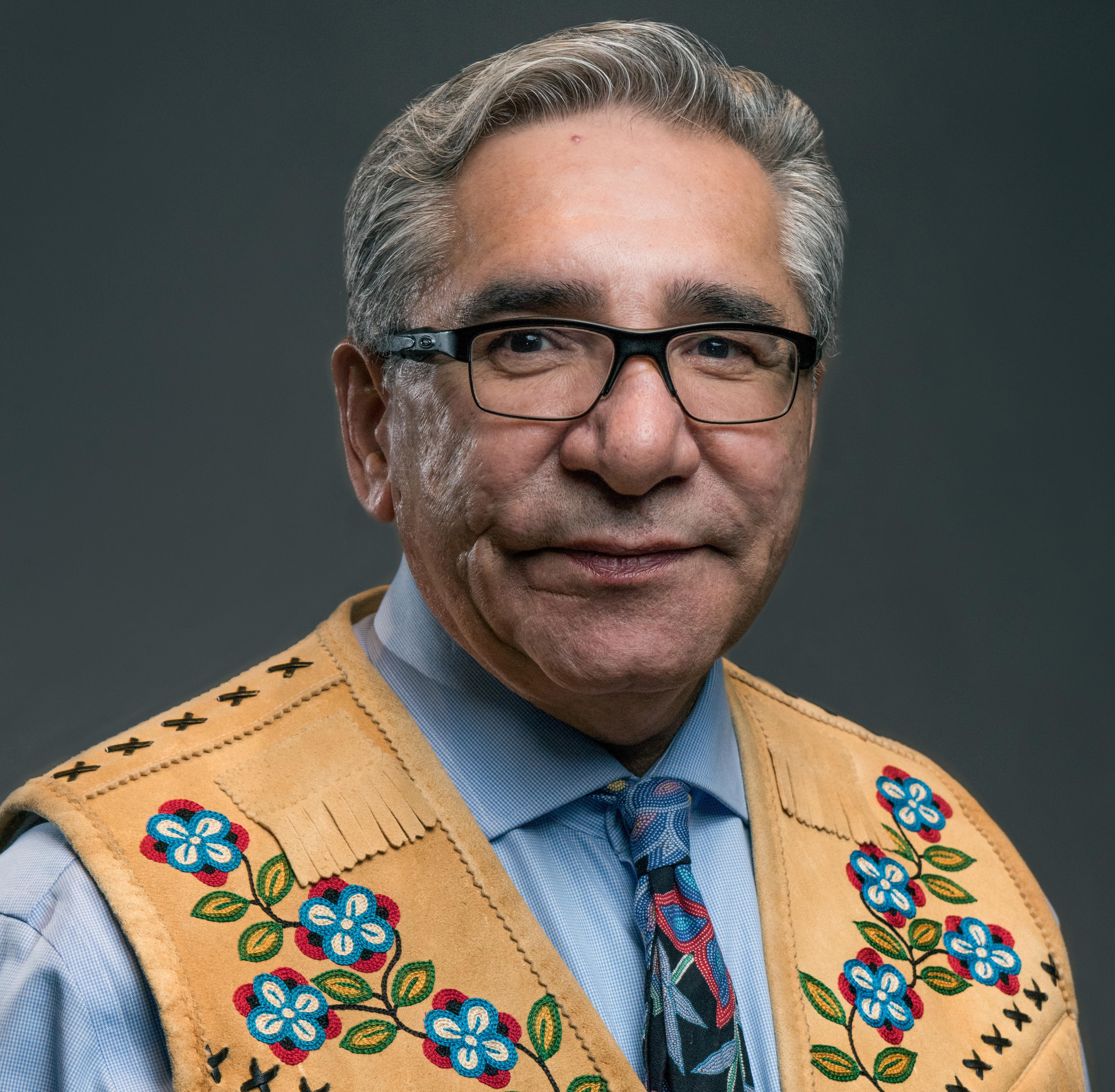
The Grand Chief reviews the year 2020 in Eeyou Istchee
Twenty-twenty has been without a doubt an exceptional year. Covid-19, a once-in-a-lifetime pandemic, has uprooted many of our lives, although Eeyou Istchee has been relatively untouched thanks to efforts by the Cree Nation Government and institutions including the Cree Health Board.
At the helm of the Cree Nation Government, Grand Chief Abel Bosum worked tirelessly on behalf of the Cree Nation to oversee this response.
The Nation asked the Grand Chief about that and other pressing issues, as well as future plans, in our annual State of the Cree Nation address.
The Nation: How has Covid-19 changed things – for the Cree government, and for the Cree Nation as a whole?
Grand Chief: There is no question that the Covid-19 pandemic has altered much of the way we do things in the Cree Nation. It has changed what we do and how we do it. But I am very proud of the fact that the Cree Nation, through our Cree institutions together with our communities, have been able to stay safe during this pandemic and we have not experienced any serious outbreak of the Covid-19 virus in any of our communities. In fact, we have not experienced a single case of community transmission of the virus since the beginning of the pandemic. The few cases among our people have all been as a result of our people being in southern Quebec, or people infected in the south coming into our communities.
We have been able to stay safe by taking things into our own hands – we recognized very early on in the pandemic that the kinds of precautionary measures and guidelines that were developed for Quebec as a whole did not necessarily address our own geographic, social and economic realities. Those measures were developed for regions very different from our own, and we realized that if we were truly going to protect our communities effectively, we would need to develop our own guidelines, our own precautionary measures, our own laws and our own initiatives. Through very close collaboration between our Cree Nation Government, our Cree Board of Health and Social Services, our Cree School Board and our communities, we introduced our own approaches for keeping our people safe, and we have carefully monitored and modified our approaches as we have all gone through different stages in the spread of the virus.
So far, we have been very successful in what we have done, and we continue to monitor, assess and modify what we are doing to ensure that our successful battle against the spread of the virus continues. Our success in limiting the spread of the virus is directly a result of our having secured the resources to ensure that our major Cree institutions are robust enough – financially and in terms of human resources – to address the major challenge posed by the pandemic. Throughout the pandemic, we have made sure that there would be regular and effective communications to our people. We have held regular meetings among the leadership at all levels of our nation involving our Chiefs and the leaders of our Cree entities that were quickly followed up with messages to our people about the latest developments in the pandemic and the latest precautionary measures.
I think it is safe to say that we have been successful because our governance is in place. Our governance has permitted us to apply our own solutions to our own challenges. We have, of course, collaborated with key Quebec institutions such as the Ministry of Health and Social Services, the SQ and others. But we collaborated with them in order to ensure that our own approaches could be implemented in harmony with the rest of Quebec. Our success in keeping our communities safe owes a great deal to the maturity of our Cree governance.
But, in reality, the success of everything we have done to protect ourselves from the virus has been a direct result of the efforts, the patience and the maturity of our people. We have witnessed repeatedly over the years that our greatest strength as a nation has been the unity of our people, and it is our people at the community level who have made the sacrifices, who have complied with the precautionary measures we have put in place, and who have understood what has been asked of them. As our communities practically shut down for significant periods of time, our people maintained their confidence in our collective approach, and it was our collective unity, and our people’s faith in our efforts, that gave our communities the comfort and the confidence to begin to gradually open up again.
I am particularly proud of the fact that all of our Cree entities have found new ways of working together toward a common goal, and I honestly believe that this reality will stay with us as we continue to work together to address a whole range of priorities for the Cree Nation. We are now looking forward to the introduction of the vaccines which we are hopeful will start to get us to a place of normalcy so that we can resume our lives in ways that are more familiar to us, and I hope that we can all look back at the last year and take pride in our achievement and take pride in the way that we placed the health of our people as the highest priority.
Mask made by Cree artist Flora Weistche

The Nation: What were some of the successes of your office this past year?
Grand Chief: In spite of our overwhelming focus on keeping our people safe during the pandemic, we have actually achieved a number of other important objectives over this past year. As we have promised, we have finally been able to implement our Cree Nation’s private housing initiative. The program is now up and running and so far we have begun to assess 40 files which have been
submitted for approval. We expect this number to increase in the coming years as we put in place our own approach to resolving the historic shortage of housing in our communities. This initiative will go a long way to addressing many of the community-based needs of our people.
I am also very proud of the fact that we have made the expansion of “protected areas” a priority for our communities. As part of the Grande Alliance MOU, we have been able to identify new protected areas which will connect the protected wildlife habitats throughout our territory. This, of course, has been done through extensive consultations with our communities and their traditional hunters and trappers. In fact, the “protected areas” initiative is the first substantive action to come out of the MOU which has now entered the process of environmental review under section 22 of the JBNQA.
It is very unfortunate that one of the consequences of the pandemic has been that we have had to put on hold the community tours that we had been planning so that we could come to each community to explain the Grande Alliance MOU, and what it could mean for our communities. The Grande Alliance is itself not a project. It is a framework for the planning of potential projects which, themselves, will need to go through the normal process of environmental and social review as required by the James Bay and Northern Quebec Agreement. Our overall perspective on this MOU is that it will be a scoping exercise in deciding which potential projects meet the needs of our communities.
Under the direction of Ms. Nadia Saganash, our Cree Nation Government has made significant progress in increasing the number of “Wildlife Protection Resources” by initiating the Eeyou Istchee Land Keepers as part of our Wildlife Protection Assistant Program
throughout our traditional territory. This initiative implements one of the important sections of our 2012 Governance Agreement with Quebec and will enhance our presence on the territory by being directly involved in environmental and conservation protection regulations and measures. I am very proud of the fact that we have finally been able to move forward with the establishment of the Cree Development Corporation so that we can be in a better position to take advantage of development opportunities throughout the region resulting in many more contracting opportunities for our Cree enterprises while, at the same time, creating very significant employment opportunities for our people. I have a great deal of confidence in Mr. Davey Bobbish who has been appointed as the Chief Executive Officer of this Cree entity and I am happy that this institution has a competent and experienced Board of Directors. This Cree entity will play an increasingly important role in the economic life of our nation. I am also very enthusiastic and proud of the fact that we have also moved forward with our Cree Language Commission by appointing Mr. Jamie Moses as our new Cree Language Commissioner. Jamie’s passion and commitment for iiyiyiuiyihtiwin and iiyiyiuyimuwin is demonstrated from his past work experience, as Cultural Coordinator for 15 years for the Cree Nation of Eastmain. Further, he brings his experience and knowledge of his culture and values as a Board member for the Cree Board of Health and Social Services of James Bay, Vice-Chair for the Cree Outfitting and Tourism Association, Board member for the Cree Cultural Institute and other working groups and committees. Jamie speaks Cree, English and French. We look forward to working with Jamie in his capacity as the Cree Language Commissioner. 12 the Nation January 1, 2021 www.nationnews.ca
Photo by Sarah Mongeau-Birkett

With regard to important cultural matters, I am very pleased to announce that the City of Montreal has agreed to repatriate a Cree beaded hood (the Gunner Hood) from the Lachine Museum to Aanischaaukamikw Cree Cultural Institute. This fine example of a Cree beaded hood belonged to the Gunner family, it is nearly 200 years old and an important part of our heritage. It had been on temporary loan to Aanischaaukamikw where it was shown in the opening exhibition. Now it will be coming home to Eeyou Istchee on a permanent basis. Aanischaaukamikw and the Cree Nation will celebrate the hood’s repatriation with a public event in the New Year.
As part of our effort to indigenize, to the greatest extent possible, the labour force in our Cree entities I was very pleased that we were able to appoint Mr. John Longchap as our new Director of Cree Capital Planning. In our effort to bring out the best of our communities I am highly confident that Mr. Longchap will successfully apply a wealth of community experience to this important Cree Nation Government position and, as he does everything, he will do so with professionalism and with creativity.
Our Cree Nation, in collaboration with Quebec and Canada, were able to work together to pay a very fitting tribute to our first Grand Chief, the late Billy Diamond.
The renaming of this critical infrastructure link that safely connects our Cree communities and the region with the economic centres of Quebec and Canada acknowledges his important role in the history of northern Quebec and also in the future development, not only of the Cree Nation of Eeyou Istchee, but of our region and Quebec as a whole. We are grateful to the family for giving us permission to pay tribute to our former leader in this way.
Over this past year, I had the opportunity to work very closely with Canada’s Minster of Justice, Mr. David Lametti, as he was given the responsibility to bring forward legislation to implement the United Nations Declaration on the Rights
of Indigenous Peoples. The Grand Council of the Crees/Cree Nation Government has been actively involved at the international level in drafting and promoting the passage of the UN Declaration for nearly 40 years. We are particularly grateful to former Grand Chief Dr. Ted Moses and Mr. Romeo Saganash who worked diligently for many years to see the fruition of this very significant initiative.
Building on a previous bill first introduced by our own Romeo Saganash, this new legislation, Bill C-15, will be an important framework for reconciliation between Canada and Indigenous peoples as called for in the Report of the Truth and Reconciliation Commission. The Declaration will also be an important source for the interpretation of Canadian law.
This legislation will contribute to ensuring that historic injustices, colonialism, and current instances of systemic racism can be addressed, while also promoting the inherent rights of Indigenous peoples to self-determination and the right of self-government. The new bill has been introduced to parliament and we look forward to its successful adoption and receiving royal assent in the coming months.
In general, over this past year, perhaps the silver lining around the pandemic is in the way in which we have all worked together to address the challenges of the pandemic. We have introduced a much more coordinated approach among all our Cree entities which will make us much more responsive to the needs of our communities and much more effective in delivering programs and services to our people in the future. I have been very pleased to see this more coordinated approach further our efforts to replace the previous approach in which each Cree entity operated in more of a silo reality. This will be extremely important as we move forward in tackling important initiatives on behalf of our people.
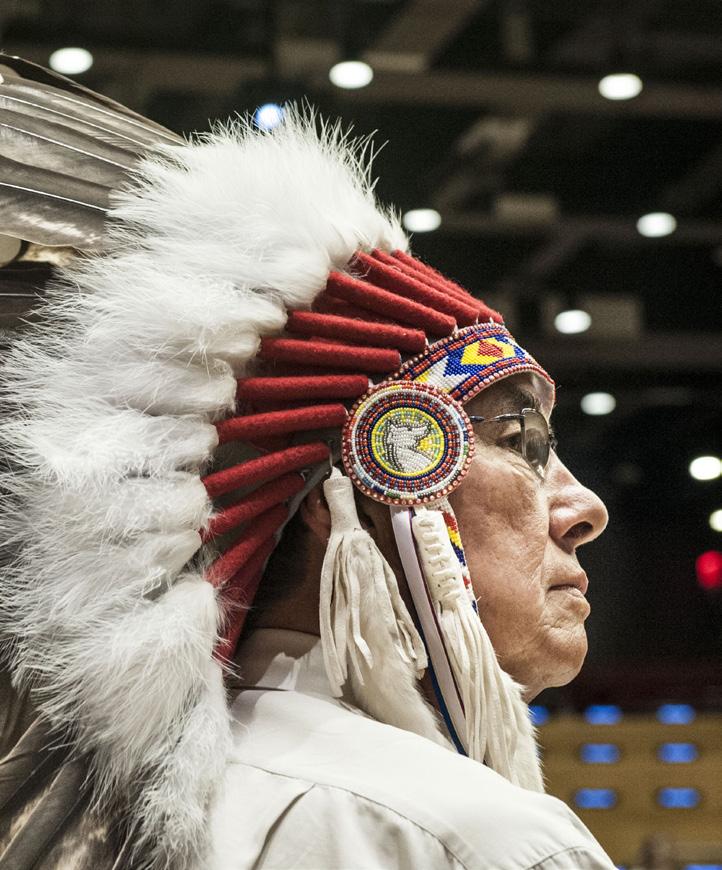
The Nation: What are some of the lessons you’ll be taking forward?
Grand Chief: One of the realities of going through a very difficult and challenging time, is that there are very many important lessons to be aware of and different practices that can be incorporated into how we will now do things.
I think that one of the most important lessons is that we have learned to rely on each another, and we have relearned the importance of our Cree values of unity and caring for one another. In prioritizing the health of our people, we have learned to rely on our own expertise, and we have learned that it is okay to trust our own instincts and decisions. In developing our own home-grown response to the Covid-19 pandemic we have realized that the way in which we addressed this challenge can easily be transferred to other priorities and other initiatives involving all our Cree entities. When it was needed most, we rose to the occasion and relied on our instincts, our traditional values and our traditional knowledge, and it worked.
We, of course, utilized all the tools available to us which made the development and the communications of our precautionary recommendations possible. We are truly grateful that we have, thanks to our Eeyou Communications Network, a robust communications infrastructure that permits us to be in touch with one another so that we can instantly inform our people of changing circumstances that they need to be aware of. Under the direction of Alfred Loon, the presence of this network has provided us with an enormously important tool which we have used to its fullest, and we know very well that without that network available to us our work would have been much more challenging. The importance of this communications network will, of course, be extremely useful in addressing major issues in the future.
The Nation: How have the Cree government and institutions managed the Covid crisis overall? How could they improve?
Grand Chief: As I mentioned before, I think that our Cree institutions have been exemplary in the way in which we have managed this pandemic crisis. We worked hard and we worked together – all of us, in our institutions, our communities, and our families. Everyone across the board worked together, particularly with our Public Health experts, with our PSOs, and others, to develop the right measures and laws that would work for our communities and our people. Our people heeded the warnings, understood them, and they have complied with all the precautionary measures that we have developed. It was not luck that successfully has gotten us through the pandemic so far, it was
hard work and having the right priorities. I am particularly grateful to all our people who made sacrifices to ensure everyone’s health and safety. Important community and social events such as weddings, funerals, holidays and vacations had to be done very differently, and in some cases, postponed. Many of our Cree workers who are employed in the mines, the hydro camps, and the forestry operations within our region, needed to do extra isolating which meant that they needed to be away from their families for longer than normal. Entire families sacrificed so that we could better ensure the health and safety of everyone. So, our gratitude really starts with the people. I would like to share with you an incident that occurred during the pandemic that not many people are aware of. We encountered a situation in Chisasibi early in the pandemic when the Elder’s Home caught fire and burned down. Our Elders who were residents in that facility were immediately relocated to new temporary facilities which were outfitted with all the amenities that they needed to be comfortable. In spite of this potentially tragic situation, we all – together – worked in sync with www.nationnews.ca January 1, 2021
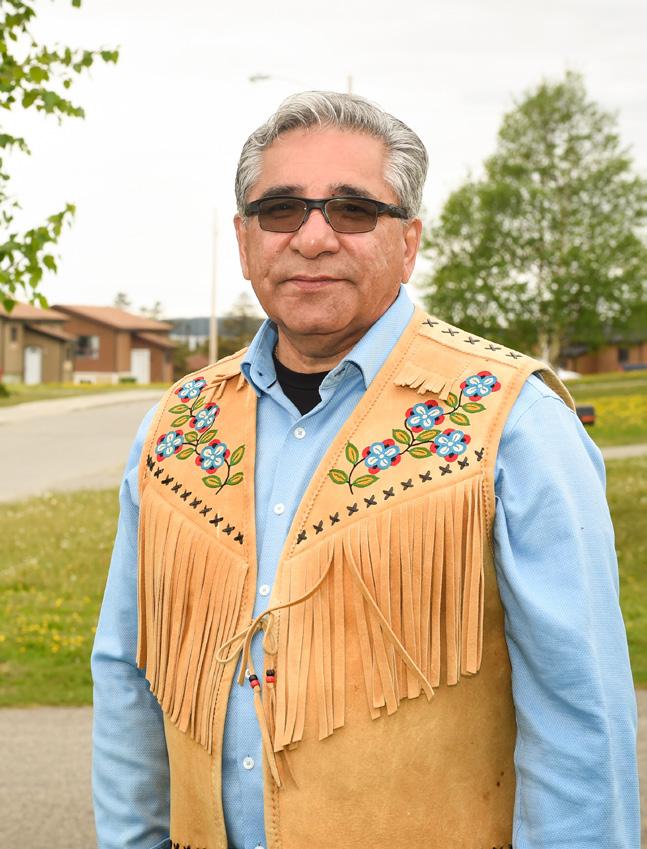
Be there for yourself the way you’re there for others
You are always there when your loved ones are going through difficult times. But don’t forget about yourself—solutions exist to help you feel better.
The current situation may cause you distress. Experiencing various levels of anxiety in some spheres of life is normal. When this happens, you may find it more challenging to deal with your thoughts, emotions, behaviour and relationships with others. Most people succeed in adapting, but listening to your needs is vital. Don’t hesitate
to do whatever is necessary to help yourself.
Take care of yourself
• Rely on your personal strengths and have confidence in your abilities. • Remind yourself of the winning strategies you used in the past to overcome difficulties. There is no one-size-fits-all solution! Each and every one of us must take steps to foster our own well-being. • Enjoy life’s little pleasures, such as listening to music, taking a warm bath, reading, exercising, etc. • If you live close to nature, make the most of it. Breathe deeply and slowly as you walk. • Learn to delegate, and allow others to help you. • Ask for help when you feel overwhelmed. It is not a sign of
weakness, but rather a sign of strength when you are strong enough to do what is necessary to help yourself.
• Lend a hand in your community in a way that respects your personal limits and public health directives. By helping others, you can improve their wellness and your own as well. • Think about what has meaning and value for you. Reflect on the important things in your life that you can hold onto in hard times. • Reduce the stressors in your life. • While it is important to stay informed, limit the amount of time spent reading about COVID-19. Information overload can increase stress and anxiety, and even cause depression.
The Getting Better My Way digital tool
Getting Better My Way is a digital self-management tool for emotional health. If you are experiencing stress, anxiety or distress, this tool can help improve your well-being by identifying practical things you can do to feel better. Learn more at Québec.ca/Gettingbetter
Give voice to your feelings
• Keep in mind that having a range of emotions is normal. Feelings play an important role in life, and it is essential to experience them without passing judgment. • Use words to express what you are going through. Do you feel alone?
Are you worried? • Allow yourself to share your feelings with a trusted friend or family member. It might also be helpful to write down how you’re feeling or call a helpline. Find what works for you! • Those closest to you may not necessarily be able to “read” you.
Express your feelings. • Leave space in your life for your feelings and those of your loved ones.
Choose healthy living habits
• Try to keep to a routine for eating, resting, sleeping and other daily activities. • Take time to eat well. • Go to bed at an hour that lets you get enough sleep. • Be physically active on a regular basis, while complying with public health directives. • Reduce your consumption of stimulants like coffee, tea, soft drinks, energy beverages, chocolate, etc. • Drink lots of water. • Lower your alcohol, drug and tobacco consumption, or simply say no to them entirely. The same goes for gambling.
Make judicious use of social media
• Use critical thinking before sharing something on social media.
Ill-advised information can have harmful effects and be detrimental to everyone’s efforts in these times. • Use social media to share positive actions. • Watch videos that make you smile.
Help and resources
We are all going through unprecedented times that can intensify our emotional reactions. For example, you might feel greater fatigue or have fears that you can’t shake, or even have trouble just dealing with the day-today. Focus on these signs of a problem and, as soon as you can, contact resources that can help you to better manage your feelings and develop new coping strategies.
• Info-Social 811
Info-Social 811 is a free and confidential telephone consultation service available 24/7
• Regroupement des services d’intervention de crise du Québec
Provides 24/7 referral services for people in distress (French): centredecrise.ca/listecentres
• Suicide prevention crisis helpline
Crisis helpline that provides suicide prevention services 24/7: 1 866 APPELLE (277-3553)
For a host of other helpful resources, visit Québec.ca/gettingbetter
Québec.ca/Gettingbetter Info-Social 811

the Cree Health Board to continue to provide the essential services for our Elders and there was absolutely no interruption in the delivery of these services. This is just one little example of how well, and how seamlessly, we have addressed any problems that have come up as we worked together to get us all through this pandemic.
The Nation: Besides Covid, what do you think were the major issues facing the Cree Nation this past year, and how did those issues get addressed, if at all?
Grand Chief: The provision of housing to our communities remains a major challenge. We continue to experience overcrowding which has been a particular worry during the pandemic, and we continue to experience many physical and mental health challenges associated with insufficient and inadequate housing. It is for this reason that we realized, once again, that we needed to take things into our own hands, and we established a $100 million fund dedicated to addressing our housing shortfall. Through our private housing initiative, it will be possible to provide our people with opportunities to build their own homes while, at the same time, we will be able to free up social housing for those who genuinely need it.
We are also continuing to have discussions with both the Governments of Quebec and Canada about how they can contribute to this housing initiative and become part of the solution.
During this past year, we signed an MOU with Quebec referred to as the Grande Alliance. This initiative, which I believe may be another very significant milestone achievement, lays out a collaborative approach between the Cree Nation and Quebec and builds on the “Paix des braves”. It provides for long-term collaboration between our two governments to identify new protected areas which will connect the territory’s wildlife habitats. The MOU also provides for the planning of projects which would extend the existing transportation infrastructure in the region to promote economic development. All projects proposed under this MOU will be subject to the rigorous environmental and social impact review process outlined in Section 22 of the JBNQA that includes community engagement at every step of the process.
The objective of this initiative is to provide predictability and stability for the economic and social development of the Eeyou Istchee James Bay Territory. This “Grand Alliance” balances our profound respect for the environment with the potential for the involvement in the development of the natural resources within our territory. In effect, this represents one more tool through which the Cree people will be in the driver’s seat regarding what happens within our territory – both with respect to economic development and more generally with respect to land use planning.
And, of course as always, we can never rest when it comes to the protection of our Cree rights. We know that we must be constantly vigilant and constantly on guard to make sure that there is no erosion, no minimizing and no disregard for our rights as Cree people and our rights as Indigenous people. Even in the context of a pandemic we have constantly been alert, and we have reacted, whenever there has been any hint that our rights might be ignored or over-ridden. It is through this vigilance on our part that we are able to protect our gains for the benefit of our future generations.
The Nation: What are your plans for the upcoming year?
Grand Chief: At this time, we know that effective and safe vaccines are on their way, and we are looking forward to working with governmental authorities to ensure that the vaccines are available to our people in a timely way. In the meantime, we still need to continue to be watchful, to be wise and to be committed to continuing to do what we all must do to keep our communities and our people safe.
We will, nonetheless, continue to the greatest extent possible, to work on those priorities that will be important for our people after we have gotten through this pandemic. We will continue to expand our housing initiative, we will continue to identify those projects which will be helpful and useful for our people in the context of the Grande Alliance MOU, and we will continue to find creative ways to communicate with our people about significant developments in our territory.
I am particularly looking forward to developing a positive working relationship with our two newly elected Chiefs – Ms. Daisy House in Chisasibi, and Mr. Robbie Kawapit in Whapmagoostui. I am looking forward to having their strong voices around the table, and I look forward to their contributions to the very many issues that we deal with at the Cree Nation Government and across all our Cree entities.
As we all are aware, we needed to postpone many meetings in our communities to make them aware of the various initiatives we have been working on. This, regrettably, has created some misunderstandings and misconceptions about some of our initiatives. During this next year we will need to redouble our efforts to find more creative ways of communicating with our people at the community level. We are blessed to have the resources to undertake new and different ways of communicating with our people and we will use these resources as effectively and as creatively as possible.
One of the events that we needed to postpone is related to the sad passing of Mr. Fred Blackned from Wemindji. Mr. Blackned was one of the very few remaining original signatories to our treaty – the James Bay and Northern Quebec Agreement. He, along with the other signatories to the JBNQA, were the heroic pioneers of our Cree Nation who took the unprecedented risk of opposing the James Bay Hydroelectric Project in the early 1970’s and took us into the uncharted territory of negotiating Canada’s first modern Treaty.
Mr. Blackned had been recovering from a stroke he had experienced last Christmas, and he was receiving treatment in a care facility in Montreal. Because of the challenges in being together physically to express our support for the family at the time of Mr. Blackned’s passing, a respectful and fitting memorial service needed to be postponed. I am hopeful that, at the appropriate time, we will be able to join the community of Wemindji and the Blackned family in a special ceremony to respectfully remember the important contributions that Fred has made over the years to his community and to our Cree Nation.
The Nation: What, if any, of the resolutions from the Annual General Assembly have been enacted so far?
Grand Chief: Among the various resolutions that were passed by this year’s Annual General Assembly, it is worth noting those resolutions that were not strictly administrative in nature and dealt with substantive issues. First, the AGA this year resoundingly approved a resolution in support of the renaming of the James Bay Highway in honour of our first Grand Chief, Billy Diamond. This initiative was supported by Quebec and was announced in November 2020. The formal renaming of the highway took place on November 11th, the 45th anniversary of the signing of the James Bay and Northern Quebec Agreement. This resolution was fully supported by the family of our late Grand Chief.
Another resolution passed by the AGA addressed the impacts of climate change on the incidence of forest fires. The resolution called for studies to conduct research on this connection, and also, to identify potential economic development opportunities associated with forest fires. The resolution also called for the introduction of mitigation measures to remove burnt trees in areas which are frequently occupied by Cree land users.
A further AGA resolution called for the commencement of discussions with Quebec with the objective of bringing to the Cree Trappers Association and to the Income Security Program greater recognition and esteem and called for the Cree Nation Government to ensure that practitioners of the Cree Traditional Way of Life are engaged in all discussions around infrastructure development with the Governments of Quebec and Canada on the same basis as scientific professionals. This
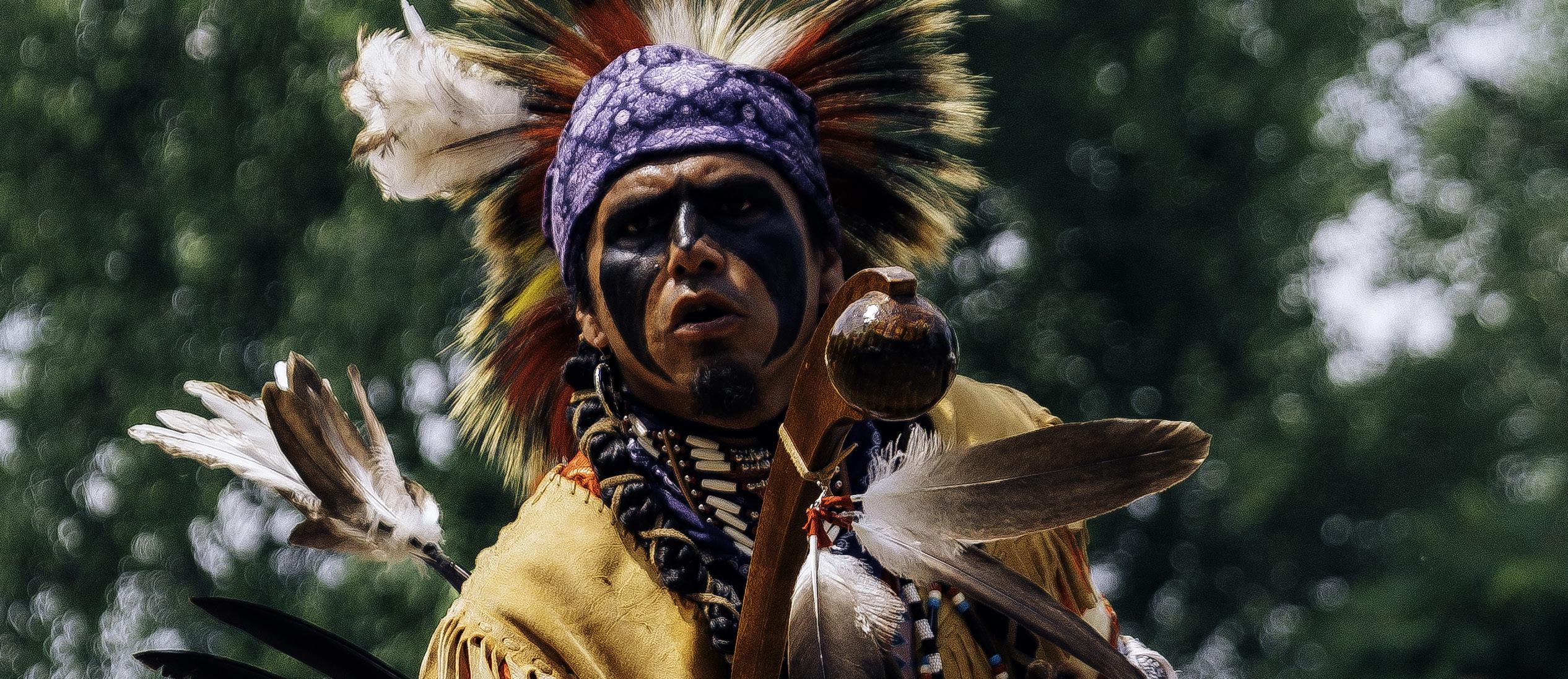
issue will continue to be a Cree priority at our Standing Liaison Committee with Quebec.
The Nation: This has been a challenging year for many people – what is your message as we go into another unpredictable year?
Grand Chief: Needless to say, 2020 was a very challenging year. But we have so far managed to get through it relatively unscathed, and we have gotten through it by prioritizing the health and the well-being of our people. We got through it by caring for one another, and we will hopefully continue to get through it until the successful introduction of a vaccine, by caring for one another.
But this did not just happen on its own. Our caring was matched by our actions. We have been able to remain safe because we decided to take responsibility for ourselves and we acted as a Nation. We have remained safe because we, as an Indigenous people, took the measures that we decided were the best for us regardless of what measures might be in place around us. We have remained safe because we have had the benefit of reaping the rewards of decades of struggle to have the institutions and the resources to map
Photo by Sherry Brunet
out a course of action that we determined would be best for our own realities. We have also remained safe because we have been able to rely on our traditional Cree values – especially those of caring and respect, to guide us. And we have remained safe because our people have been united in taking the precautionary measures that have been recommended because we care for each other and because that is what we Cree people do in dangerous times.
As we look forward to an early transition to some semblance of normalcy, the lessons we have learned, and learned together, as we have dealt with this pandemic will continue to serve as we tackle important initiatives on behalf of our people. The lessons we have learned are important ones and we will incorporate these into how we do things in the future.
The Nation: Any other final words to share?
Grand Chief: I very much would like to take this opportunity to express the gratitude on the part of the entire Cree Nation to all those front-line workers, including those from outside our communities, who have chosen to be with us, and to stay with us, as we have worked so hard to keep our communities and our people safe throughout this pandemic. We have among us so many professionals and para-professionals who have demonstrated their commitment to the well-being of our people and who have sacrificed and risked their own health and safety. We are grateful to the doctors, the nurses, the teachers, and to our police officers who have been separated from their families to be with ours. A number of these workers have even made the decision to give up their holidays with their families for the sake of our health. To those individuals, please know that we recognize the work you are doing on our behalf, and we deeply appreciate what you do for us. You will forever remain in our hearts.
To our Cree people of Eeyou/ Eenou Istchee, and to our friends beyond, I would like to wish you the best possible holiday season, and I wish you peace and contentment in the New Year. May you all find comfort in being with your loved ones, may you experience satisfaction in this year’s more limited social contacts, and may you all find joy in the knowledge that we are now safe, and that we will likely continue to safely get through this pandemic, and as we do so we set an honourable example of what is possible when the health of our people is the highest priority.
Mandy Gull
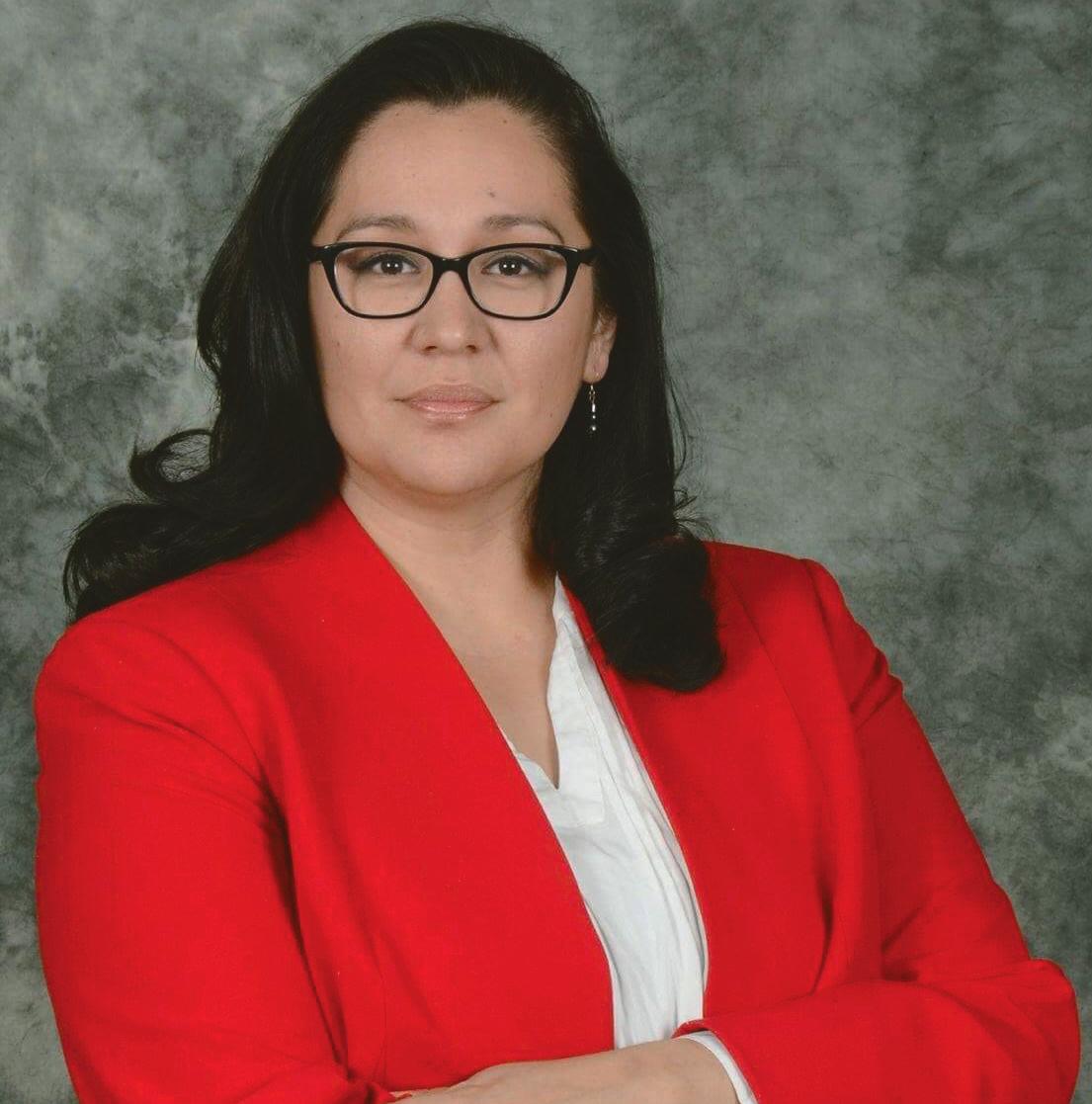
Deputy Grand Chief
Iwould like to express my thanks to the members of the Cree Nation who have worked with and supported us in one of the most challenging times. 2020 has had significant impacts on every part of our lives – it has completely changed the way we worked, communicated with each other and most significantly had an impact on our families connecting.
The work of our community members and local members has been the key to the success of keeping Covid-19 out of our local communities and protecting our nation as a whole. I would like to express my appreciation for the frontline workers and essential service workers who continued to show up and serve the Cree Nation.
One of the most significant files this year from my office was the announcement of the protected areas network. This initial step in reaching the 20% targets was a key milestone and would not have been possible without the knowledge and wisdom of our Cree tallymen, land users and those that have shared with us directly and in consultations essential information relating to the Cree territory and wildlife. I would like to thank the technical members that have continuously worked with the Cree Nation Government staff to ensure that their input was reflected in a protected areas network that targeted sustainable Cree driven conservation and protection of wildlife and their habitat.
I also express my personal thanks to our protected areas coordinator at the CNG, Chantal Tetreault, who has successfully obtained funding, built a team and continued to work in this file during these challenging times. It was truly an honour to learn the goals of the protection measures for each community. I continue to look forward to working with you on this file as we embark on consultation processes and gathering input in the final study phases of this project. There is still a lot more work to be done and I look forward to hopefully seeing eeyouch in person in these next phases. 2020 has also been one of the most challenging years as a leader. My concern for the safety and health of our members was very high and I am so pleased with all the efforts carried out to ensure the highest level of protection in our nation. This has also been one of the loneliest years for me as travel restrictions and protocols have prevented my ability to participate in many community events. I want to express my thanks to the communities that receive me for the events that I was able to attend.
The highlight of my year was the Cree graduations and seeing a high number of graduates accepting their diplomas. I would also like to acknowledge the hard work and effort of our
Cree postsecondary students who faced many challenges this semester. Some of the students travelled and worked from areas of risk and attended in class sessions while others participated online through distance learning and I believe that each of these were extremely challenging.
I would like to thank every student who committed themselves to having a successful term despite the many challenges they faced. I would also like to congratulate you on overcoming one of the most difficult semesters in your academic career. I am extremely proud of you. I truly believe that the work of each student will contribute to a stronger future for the Cree Nation. Your effort and work are highly valued.
This year has been sadly marked by the loss of many members of the Cree Nation and I wish to express my deepest sympathies to those that will be celebrating the holidays without a loved one present. My own family has been personally marked by the tragic loss of my late father-in-law George Masty in a battle to cancer and Covid-19. I will continue to keep our members in my prayers.
I say thank you to all Cree Nation Government staff and administrators who continued to provide service throughout the duration of the pandemic. I am extremely pleased to know that you will be taking a longer break during this holiday and I wish you all the best during this Christmas season.
Lastly, I thank the Grand Chief, the Chiefs and council board representatives who have continued to attend our sessions and help govern our nation in making some very challenging and creative decisions to keep things moving forward.
I wish every single member of Eeyou Istchee a Merry Christmas and health and happiness in the New Year. I look forward to what 2021 will bring for us.
Ouje-Bougoumou
Chief Curtis Bosum
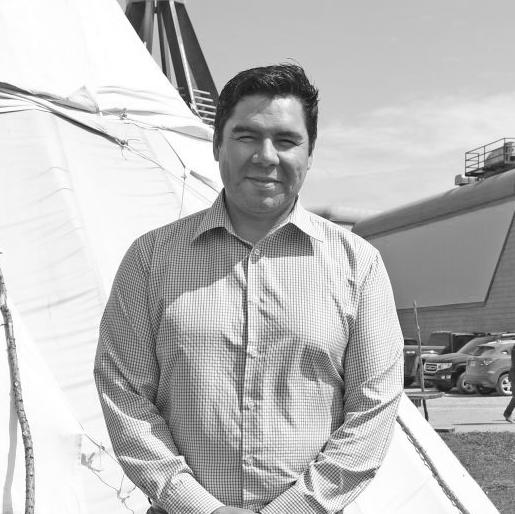
Greetings to everyone in the Cree Nation of Eeyou Istchee!
For the community of OujeBougoumou, as for the entire Cree Nation, our greatest preoccupation, and our greatest challenge has been in dealing with the Covid-19 pandemic.
We have been challenged as we have rarely been in our history to protect our community members, and our Nation, from the spread of the virus into our communities. We realized very early on that if the virus were to take hold in any of our communities it could spread quickly and uncontrollably and have devastating consequences for the health of our people.
We are culturally very close and closeknit and our close connections through our extended families are part of who we are. At the same time, in the context of our community life where all our communities are experiencing housing shortages and over-crowding, we knew that we would be particularly vulnerable to the rapid spread of the virus if it were to appear in our community.
So, in concert with the Cree Nation Government, our Public Health Department of the Cree Health Board, the Cree School Board, as well as other Cree entities, we worked together to come up with the recommendations and the laws that we could enforce locally to make sure that our community remained safe and that our people remained healthy.
Ouje-Bougoumou wishes to express its gratitude to the Cree Nation Government for taking the initiative to bring all Cree entities to together with our communities to develop our own approaches to this pandemic in a way that reflects our own realities and our own circumstances, even if that has meant not adopting the measures that have been developed for Quebec generally.
It took wisdom and courage on the part of the Cree Nation to do it right, and that has worked for us all. I am proud that collectively we have acted like a Nation – we have identified a crisis, reacted responsibly, and secured the support of our people to do their share in getting us all through this crisis safely.
At some point very soon, the vaccines that will further protect us from the Covid19 virus will arrive and we will be able to resume some form of normalcy. Projects that have needed to be put on hold will resume, our normal interactions among one another will return, and we will need to ensure that issues, projects and initiatives that have needed to be postponed will be relaunched.
Looking forward to that post-pandemic time, I see the possibility of a quite a bit of dynamic activity in our community as we try to make up for those postponed initiatives. I look forward to the latter half of 2021 when we can re-focus our energies on implementing these projects and take on new ones – all of which will continue to enhance the quality of life in our community.
I must express my unending gratitude to the people of Ouje-Bougoumou who have listened to our Cree leadership – both at the national and local levels – and who have complied with the precautionary measures and laws that have been developed over the course of this pandemic. By taking this situation seriously, and following what has been asked of them, our people have made an enormous contribution to the safety and the health of our entire community.
This has been a particularly challenging time for our people in view of our proximity to the towns of Chibougamau and Chapais, where precautionary measures were different from those developed for the Cree communities. Our people showed their faith in the Cree leadership to work on their behalf and to develop the approaches that work for our Cree communities.
This last year has been another test of the unity of the Cree Nation, and we have met that challenge as we always do – with wisdom, understanding and respect for one another knowing that when we place the health of our people as our highest priority, we are always doing the right thing.
I would like to extend my best wishes to the members of the Ouje-Bougoumou Cree Nation, to the other Cree First Nations of Eeyou Istchee, and to all our friends and colleagues beyond for a New Year filled with joy, with eager anticipation of a return to normalcy, with a bit of patience to continue to follow the precautionary measures until the vaccines arrive, and above all, with health.
Miigwetch.
Chief Daisy House

Chisasibi
It has been quite a challenging year to say the least for everyone all over the world amid the second wave of the Covid-19 pandemic, but as the saying goes, “This too shall pass.” Our Elders and our ancestors have always reminded us of the importance of preserving no matter what comes our way as they are examples of where we came from, where we are now and where we want to go as people and as a Nation.
The Cree Nation has indeed come a long way as we recently celebrated on November 11, 2020, the 45th Anniversary of the signing of the James Bay and Northern Quebec Agreement (JBNQA) and we have far to go yet. Chisasibi is not any different in that respect. Many of our entities, community organizations and residents have all come together to provide the best possible health care and community services, and local or regional events and celebrations, even amid the pandemic.
We can all look back and say that we have adapted, evolved and are able to think outside the box even after the World Health Organization declared Covid-19 a pandemic on March 11, 2020. We are extremely happy to hear that vaccinations have begun all over the world. It is cause for celebration, but we must also not forget the tremendous loss for many the world over. Our thoughts and prayers are with those during these unprecedented times. As our Elders often remind us, we must not allow our losses whatever they may be to stop us from achieving whatever we set out to do. “If you have discipline, drive, and determination, nothing is impossible.”
The following are some of the highlights for Chisasibi for 2020: • Local Science Fair in February. • Community Spirit Month activities for the month of March. • Chisasibi held our first-ever Drive-In Outdoor Concert on July 26. This was our first event we ran for the community during the summer. We had two local bands perform: Fort George Rockers and Cree Rising. It was held at the High Ground park. • We created a Facebook Private Group page – Social Distancing in Chisasibi for our community members as a way of entertaining and socializing during quarantine. It was our way of socializing and keeping in touch as a community without getting together in person. On this page we have had live concerts by Terri Anne Strongarm, Chelsie Young, Paul Napash; a comedy show by Don Burnstick; a live drive-in concert; square-dance competitions; live yoga, cardio dance and meditation; teachers (from both schools) prepared videos of activities for the children to continue learning while in quarantine; a Virtual Blanket Exhibition; online workshops – Changing the Culture of Violence with Don Burnstick; and a variety of fun activities – a photo hunt, contests, etc. • Chisasibi celebrated 39 years August 18 with a drive-thru barbecue and outdoor concert. • We had a drive-thru Grade 6 graduation in August. • We celebrated our annual gathering on Fort George Island at the end of August. • Inauguration of newly elected Chief Daisy House, Deputy Chief Paula Napash and 11 Councillors on September 11. • On September 19, James Bay Eeyou School and the community celebrated the graduation of 71 Secondary 5 graduates. • We hosted an online and on regional radio Roundtable on Higher Education – Cegep Project broadcast jointly with the Cree School Board on September 30. • Grieving workshops organized by Brighter Futures. • On November 11 we had a nice visit from caribou who came across the river to send their greetings before leaving again. It was a welcome and rare visit. How fitting on Remembrance Day and on the 45th anniversary of the signing of the JBNQA. • The inauguration of Mr. Bertie Wapachee as Chair of the Cree Board of Health and Social Services of James Bay on November 27. • In December we held a virtual Chisasibi Arts & Crafts Sale. Our local artists sold their crafts via Facebook instead of at the auditorium or Commercial Centre. • James Bay Eeyou School Secondary 4 & 5 Virtual Orientation and in-person local presentations. • 100 km Challenge (Run Chisasibi). • Virtual School Christmas Concert • Community Christmas Parade • Outdoor Dance Competition • Outdoor Princess Pageant • Car Rallies • Radio Bingos started again • Clown Night (Halloween)
We had many firsts amid the pandemic. We had online learning for many of the students, virtual Council meetings, virtual local and regional general meetings, new grocery delivery services. Many spent more time at their camps such as Louie Rene Kanatewat, who was able to spend 150 days with his whole family. Many families continue to spend time on their traplines learning the ways of our ancestors and passing on the Cree knowledge and teachings.
On behalf of the Cree Nation of Chisasibi and Council, we wish to extend our sincere thank you to all the health care professionals, front line workers, local and regional leadership for all their hard work in helping to keep our communities informed and safe amid the pandemic.
Merry Christmas and a prosperous and safe New Year to one and all!
Cree Board of Health and Social Services of James Bay The CBHSSJB Bella M. Petawabano, Ex-Chairperson & Incoming Chairperson Bertie Wapachee
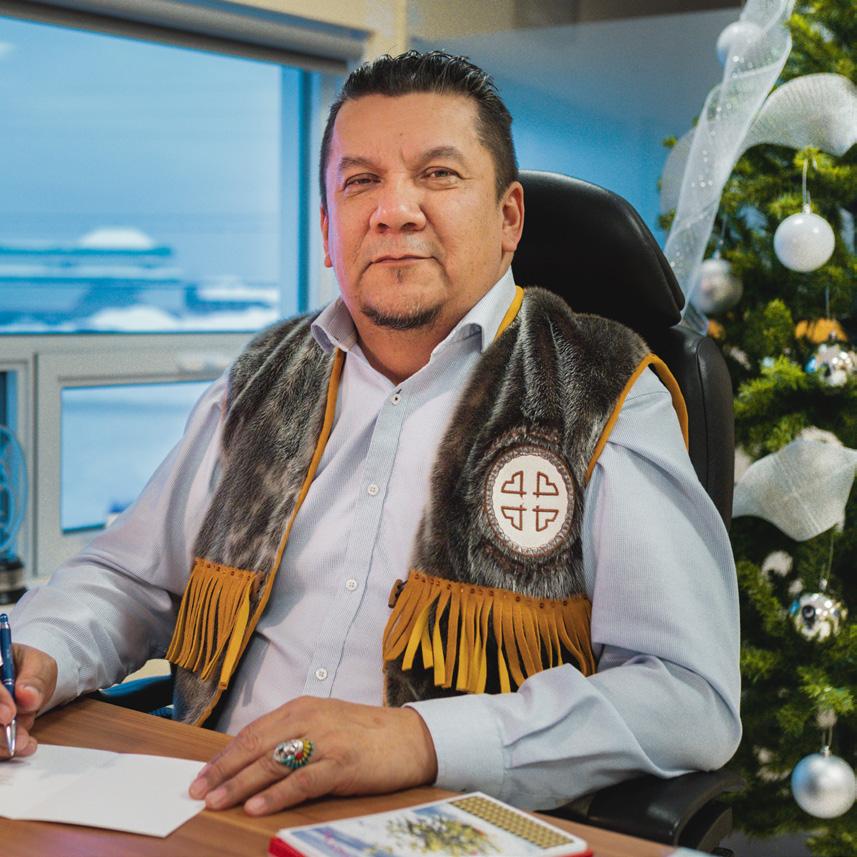
2020 was a challenging year for the CBHSSJB, as the Covid-19 pandemic spread around the world. As of December 15, there were 17 cases among residents of Eeyou Istchee, including one death. Three Elders who were living in longterm care in Montreal also passed away.
The Cree Health Board is proud of its role in preventing community transmission of the virus in our communities. The cases that occurred were quickly isolated and contact-traced. There was an unprecedented level of collaboration between regional and local entities, businesses and community partners to protect Eeyou Istchee from Covid-19. Now that safe and effective vaccines are becoming available, Public Health and other departments are working through the holidays to plan the upcoming vaccination campaign. To stop the Covid-19 pandemic, it is important that all of us act to reduce our chances of being exposed to the virus in the first place and reduce the risk of spreading it to others.
In November, following a run-off election, the organization said goodbye to Bella M. Petawabano, Chairperson for the last eight years, and welcomed incoming Chairperson Bertie Wapachee. Mr. Wapachee knows the organization well as he was Chairperson from 1999-2003. He hit the ground running, holding meetings with CBHSSJB staff and partners, and chairing the December meeting of the Board of Directors.
In spite of the challenges due to the pandemic, the CBHSSJB celebrated many achievements in 2020, including: • Inauguration of the new Youth Healing Centre for Eeyou Istchee in Mistissini • Work on capital projects including new Community Miyupimaatisiiuun Centres (CMCs) in Waskaganish, Ouje-Bougoumou and Whapmagoostui, Chisasibi Birthing Home, Landbased Healing, Elders’ Homes and housing, and the 52-bed Regional Health Centre in Chisasibi, which will replace the current Chisasibi Regional Hospital. • Graduation of 25 employees with Certificate or Diploma in Health and Social Services Management at McGill University, as part of the Indigenous Succession Program. • Collaboration with the Cree School Board on direct-to-employment training programs. • Work with the Canadian Red Cross to set up a temporary Elders’ Home in Chisasibi and develop mobile field hospital capability. • Launch of the new Creehealth.org website. • Improvements at Espresso Hotel including a new valet service and improved meal service. • Continued expansion of home hemodialysis services. • Pan-Canadian award for patient safety from Salus Global for Midwifery services. • Launch of the 24/7 Wiichiwaauwin Helpline for mental health support: 1-833-632-4357 • Ongoing work with the Quebec government to update and improve health and social services legislation. • Signing of a new agreement with the Nishiiyuu Council of Elders (NCOE)
We wish the Nation’s staff and readers a safe and peaceful holiday season.
by Ben Powless
Jamie Moses teaches traditional cooking – on social media
Many in Eeyou Istchee will know Jamie Moses as either the newly elected Cree Language Commissioner, as the outgoing cultural coordinator in Eastmain, and/or as a long-standing advocate for the Cree culture and language. But for his followers on social media, he’s become a go-to source for Cree cooking videos and posts.
In one video, Moses shows how to roast a goose over a fire – the first video in Cree, the second in English. Showing how to string up a goose over a fire inside a teepee, he walks the viewer through every step, from adding herbs and spices to explaining how to hook the goose and secure it above the fire.
“I was reaching out to encourage people to keep our traditional activities, using technology to share the pleasure I have around the fire,” Moses told the Nation. He says the video on preparing a goose was especially popular, showing a coastal method of preparation, something he inherited from his grandmother’s side.
“There’s a Cree version to demonstrate the importance of language – and I had a demand for posting it in English. It’s important for Englishspeaking people to understand why the Cree go crazy for geese and why it’s important to harvest geese,”
Moses explained. “It’s an important part of who we are. It’s more than just food, it’s about the activities that come with the harvest, being around the ladies where they’re talking Cree, being around the fire, and enjoying the goose together around the dinner table.” One video in Cree shows the steps for processing bear grease. Another shows a porcupine being gutted and inflated before the quills can be burned on a fire. Plus, there’s a post featuring a dead bear’s head, explaining the traditions and beliefs from Eastmain about marking the bear so that it won’t spot you on your next encounter. Many of his videos have hundreds of views, and have been commented on, sometimes with questions asking for more information. Moses is encouraged by the positive feedback. He says that his grandfather encouraged him to adapt to change, using whatever tools could make hunting or trapping easier, and it’s the way Moses has approached social media in this online age. “Sharing that knowledge with hundreds of people on social media is great. I’ve used it to encourage others to learn and practice our traditions and not to shy away from challenging ourselves to do them.” Part of his motivation comes from showing younger people that they 22 the Nation January 1, 2021 www.nationnews.ca
don’t have to rely on Elders when there are events like community feasts or walking-out ceremonies – that everyone can learn the skills of traditional cooking.
Growing up around his grandparents, the last generation in his family to live off the land and not attend residential schools, Moses was able to learn a lot of the traditional knowledge that’s slowly being lost. His grandfather had learned how to do many of what were considered women’s tasks, and encouraged Moses to do the same, saying, “On some of the harvest trips you’ll be doing there will be no women around, so you need to know how to cook for yourself.”
It’s a lesson that Moses took to heart and hopes to share, especially with those who didn’t grow up with the same opportunities. “Not everyone has grandparents who show them these traditions, so we need ways for those who didn’t learn from their parents and grandparents. That’s why I feel obliged to show demonstrations so people can understand how it’s done. I want to show that some people do it differently, but there’s no wrong way,” Moses explained.
Moses is concerned that certain meals and techniques for preparing animals are being lost. He points to porcupine and says many people don’t want to learn the intricate methods for preparing it.
“One day, I’ll be a grandfather and if my grandchildren are curious and ask if we eat porcupine, I want to show them. I don’t want to just say yes, we used to eat them. What kind of reaction would they have if I couldn’t show them?” he asked.
For Moses, cooking around a fire is a way to be transported back in time, to being a child again in the teepee with his grandparents. Even though his grandparents are in their 90s and can’t go to the teepee anymore, Moses says it feels good knowing he’s practicing something they taught him. And sometimes he just likes to escape into the teepee to get away from everything.
“It’s the feeling when I miss camp, being around the fire roasting a goose or boiling tea instead of being so busy with life. Sometimes we don’t make time to stop and enjoy our traditions and we Crees are very lucky to have the privilege of teepees in our backyards,” Moses said.
For younger people who are just starting to learn how to prepare traditional foods, Moses offers this advice: “Have someone guide you in how things were done and be open minded. Don’t limit yourself to only the traditional ways of how things were done. Be creative, you have to really enjoy it.”

